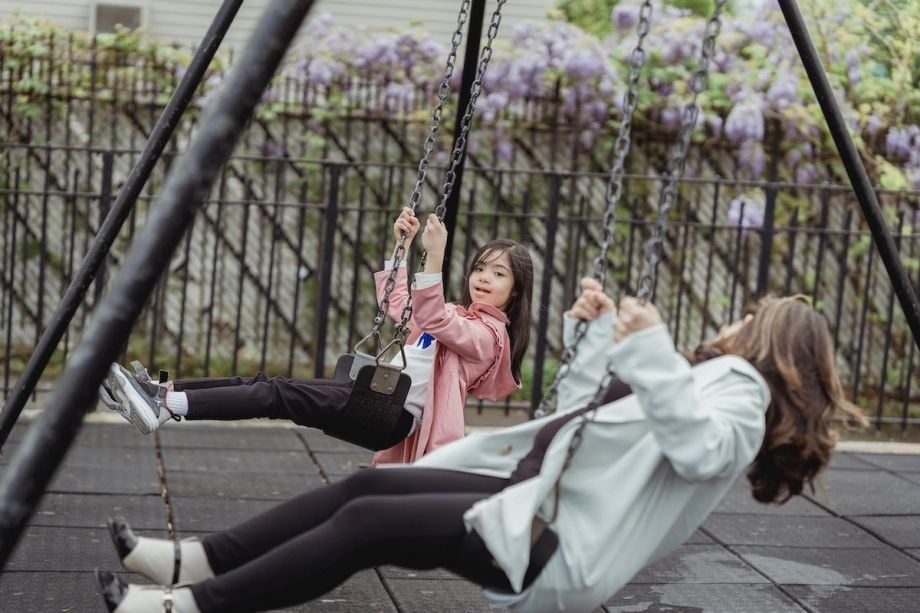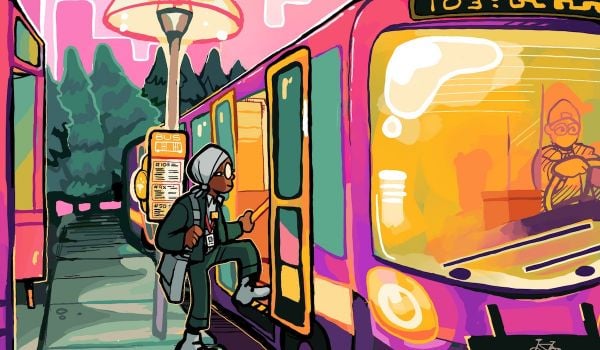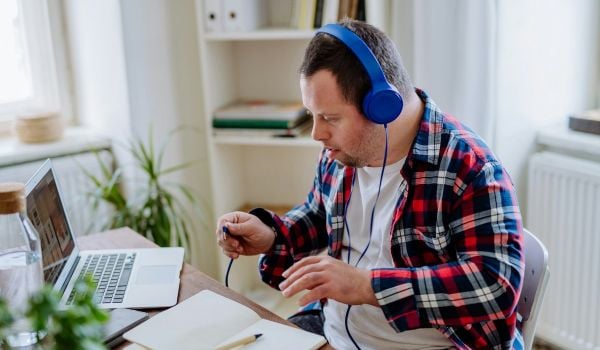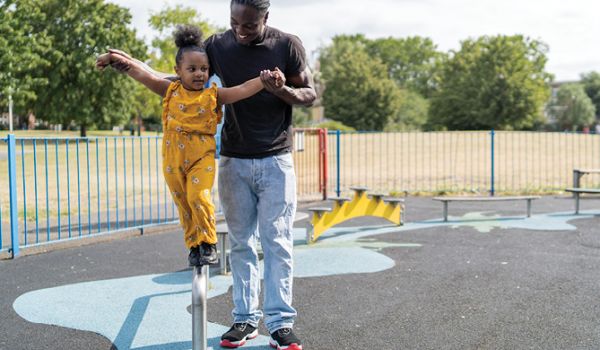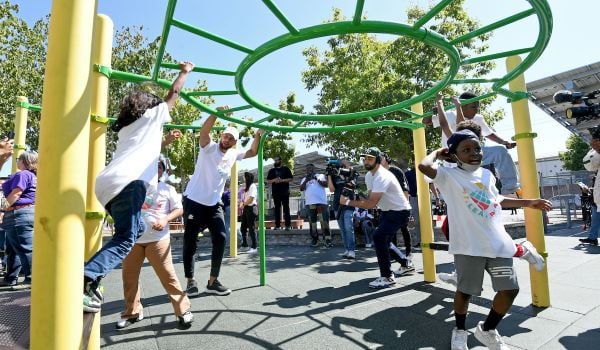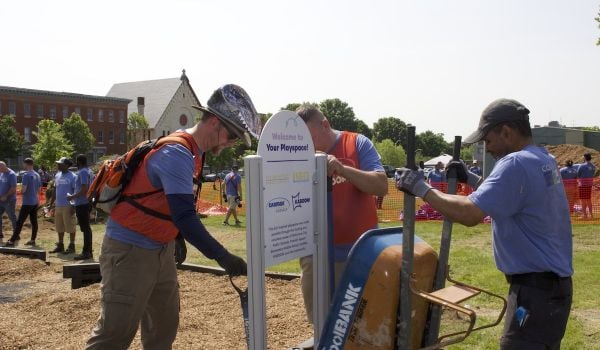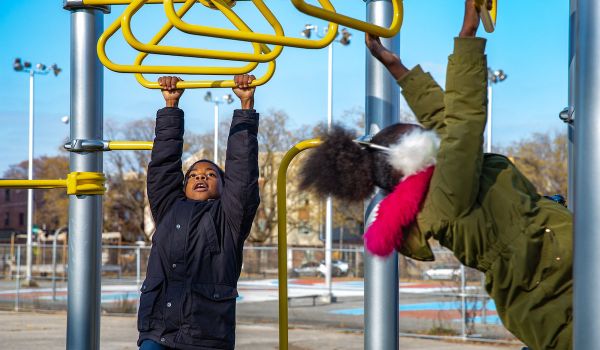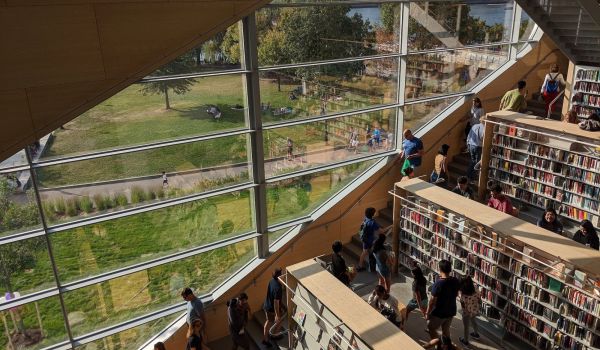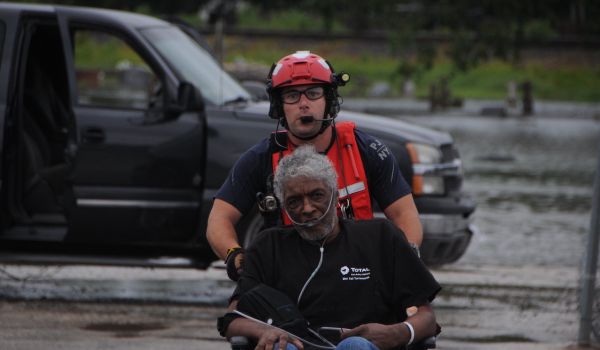Next City and Prism’s series “Disability Justice For All,” covers how people of color are leading a disability justice movement in American cities, making strides toward equity in housing, mobility, labor, health care and beyond.
When Tiera Turner’s first son was diagnosed with autism in 2019, “there was not a place where we felt we could be comfortable, or I felt I didn’t have to apologize for my child,” she says. Now with two sons diagnosed as autistic, Turner has found that services to support children with autism and their families are few and far between in Detroit.
That problem didn’t just apply to education, health care, and the usual suspects. When it came to play-space access, Turner found countless barriers to finding spaces suitable for her children and other neurodivergent kids to play in her city.
“Having a place where I can take him is hard,” says Turner, who runs an annual autism awareness walk and a local support group for families like her own called Autism in the D. “I wouldn’t even say that the city of Detroit has any parts that are sensory-friendly or autism-friendly at all.”
In 2021, there were about 40,000 children in Michigan with autism. Yet few Michigan parks have accessible features designed for kids on the spectrum, such as a picture exchange communication system (PECS) that uses images and symbols to facilitate communication for nonverbal kids. On top of that, Detroit winters can keep kids from accessing outdoor time throughout the year, making accessible play spaces even harder to find.
Turner decided to create a neurodivergent-friendly play space in her own backyard, with a trampoline, rock climbing wall, and water activities for her sons. But most kids, she knows, aren’t so lucky.
Now, Turner is turning a vacant property on Detroit’s West Side into a sensory gym and activity space. Part of the national We Rock the Spectrum franchise, it will be tailored to meet the needs of families with neurodivergent children.
Its slogan: “Finally, a place where you never have to say ‘I’m sorry.’”
Creating space for accessible play
Dina Kimmel opened the first We Rock the Spectrum gym in the Los Angeles neighborhood of Tarzana in 2010 to create a space for her son, Gabriel, who was diagnosed with moderate-to-severe autism.
“I had no idea about the need for it,” Kimmel says. “I just knew what my son needed and my daughter [who isn’t on the spectrum] needed. She wanted to feel like she belonged also.”
She and her son had often been kicked out of gyms after he had meltdowns due to overstimulation. So, she began renting out a local gym for Gabriel’s sessions with an occupational therapist. Kimmel also transformed a room in her home into a private gym for her son fitted with sensory equipment. The effect, she says, was immediate for Gabriel: fewer meltdowns, better sleep, better eating habits. It also became a place of joy for her non-autistic daughter.
“My husband’s a musician,” she says. “And so we’re like, if we’re gonna have a kiddo on the spectrum, we’re gonna rock it.”
When Kimmel found out that the local gym was closing, she decided to lease the property and turn it into a gym for children of all abilities. In 2013, the organization franchised and expanded to 78 domestic locations within six years. Today, there are 140 We Rock the Spectrum gym locations across eight different countries.
“Having a place where your child can come and be themselves and, if they’re not perfect and they’re gonna scream and they’re gonna have a tantrum, no one’s gonna stare at them and no one’s gonna kick them out is really important,” Kimmel says.
Children who play in We Rock the Spectrum’s Baltimore location see the gym as a space where they can be themselves. “I like that I can be me; I feel safe and have fun,” Tyler C. says.
“I don’t want to leave. Can I spend the night? It’s my favorite gym,” says Skylar P. Says Bella M.: “I love the play gym.”
The benefits of play for youth development is well documented. Play can teach children how to manage stress, socialize, and develop self-regulation and cognitive skills, and it can be especially beneficial for neurodivergent children. “Play therapy helps children with autism to engage in play activities of their interest, express themselves in comfortable ways, and change their self-expression from unwanted behavior to more non-injurious expressive behavior,” according to a study published in the World Journal of Clinical Pediatrics in January.
The need for autism-friendly play spaces is only growing. Autism diagnoses have been rising steadily since the CDC began tracking it in 2000, largely thought to be due to better diagnostic practices and greater awareness. According to the CDC, 1 in 36 8-year-olds has been identified as being on the spectrum as of 2023. This has jumped from 1 in 44 kids in 2018.
Research shows that children of color have disproportionately less access to play spaces. It’s a problem compounded among disabled and neurodivergent youth of color, such as Turner’s kids.
The gym is tailored for neurodivergent children, and because many have neurotypical siblings, neurotypical youth are also welcome in We Rock the Spectrum gyms. All gyms feature the PECS system, as well as iPads with Proloquo2Go, an augmentative and alternative communication app for children, teens, and adults who are either nonverbal or who have difficulty speaking.
We Rock the Spectrum also uses equipment that engages different senses children develop through play. These include the vestibular system, which is responsible for balance and coordination, and proprioception, or the awareness of body parts’ positions relative to one another.
Each indoor playground includes 12 pieces of equipment designed for the needs of kids with sensory processing disorders in mind. The We Rock the Spectrum gyms’ equipment includes trampolines for balance and monkey bars for upper body strength, climbing mountains for bilateral coordination, hammock swings for relaxation and deep pressure stimulation.
Besides equipment, the gym will also have staff who have undergone registered behavior tech training to understand the unique needs and behaviors of neurodivergent children. Therapy is not a part of the gym’s offerings, though applied behavior analysis (ABA) therapists can rent out individual rooms in the facilities.
“I would say at a minimum 90% of our locations work with ABA therapists … who rent out rooms,” says Kimmel. “It’s a perfect fit as they can also include sensory play for breaks and consequently have the child absorb more of the therapy they are given.”
Being trained in the therapy also lets parents know that the staff is familiar with the behavioral patterns of autistic kids.
“I don’t like the way that people are hired to work with children on the spectrum,” which can sometimes stop at a basic background check, says Turner.
Like other gyms in the franchise, Turner will hire and train specialized staff who will allow the gym to offer respite services and one-to-one care that can be covered by insurance. That will allow parents to get a break knowing their kid is with someone who understands neurodivergence.
“I can’t just drop my kids off to everybody else because not everybody knows how to ‘deal’ with my kids,” Turner says. “Making sure that I would accept it for my child is going to be the major difference for this gym.”
We Rock the Spectrum is also trying to open opportunities for disability inclusion through volunteering and employment opportunities.
As neurodivergent children grow up, they face barriers to entering higher education and the workforce. Students with disabilities at large go on to enroll in higher education at lower rates. During the 2019-20 school year, only 23% of students with disabilities said they enrolled in higher education immediately after they finished high school.
Moreover, those with disabilities are much less likely to be employed than those with no disability. While 65% of people without disabilities were employed in 2022, only 21% of those with disabilities were employed.
Kimmel signed up for a coach-in-training program based in the city that employs adults on the spectrum up to age 22. “They greatly benefit by learning communication skills, working on eye contact, and getting the life skills to prepare them to go out there in the workforce,” she says.
Some participants will offer one-to-one support for kids in the gym, while others may work in marketing or other roles to support We Rock.
“I have seen miracles happen where it could be three, four years that these young adults are in the gym and volunteering and then all of a sudden become employees,” Kimmel says. “I get emails saying, ‘Thank you for being the first person to hire me. I just graduated college.’”

Bianca Gonzalez (she/they) is a writer intent on using words as a tool for social change. She is a solutions journalist for Next City, a case study writer for Community Solutions, and a daily news writer for Biometric Update. As a queer, Latina brain cancer survivor, she believes that justice is fundamentally intersectional.

